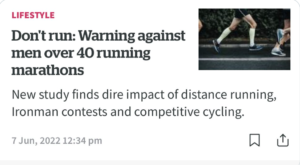From the Herald today (from the Daily Telegraph)

The story is somewhat better than the headline — for a start, it mentions in the second sentence that this is unpublished research being presented at a conference, so it’s really just a press release and there won’t be much further information available. There’s a slightly more detailed story at Yahoo, from the Evening Standard.
You might think from the the headline that the research studied men who ran marathons after the age of 40, and that it came with recommendations not to do this. Not quite. These were people aged over 40 who had taken part in more than 10 endurance events and had exercised regularly for at least 10 years, but quite a lot of their excessive exercise could have taken place when they were under 40. More importantly, there wasn’t a “warning”: the Yahoo piece quotes the researchers as saying
“In non-athletes, aortic stiffening is associated with heart and circulatory diseases.
“How this finding applies to potential risk in athletes is not yet fully understood, so more work will be needed to help identify who could be more at risk.”
As usual, this isn’t the first piece of research on the topic.
Earlier research of endurance athletes over 50, from 2020 (press release, paper) supports the current findings. It did find enlargement of the aorta in male but not female athletes, and like the current research it came with vague concerns rather than dire warnings
The first option is that aortic enlargement among masters athletes is a benign adaptation and another feature of the so-called athlete’s heart, where big is good. “The alternative is that being a lifelong exerciser may cause dilation of the aorta with the sort of attendant risk seen in nonathletes.”
A 2021 paper looked at the ‘aortic age’ in people doing their first marathon, at ages ranging from 21 to 69. It found
… a reduction in “aortic age” by 3.9 years (95% CI: 1.1 to 7.6 years) and 4.0 years (95% CI: 1.7 to 8.0 years) (Ao-P and Ao-D, respectively). Benefit was greater in older, male participants with slower running times (p < 0.05 for all).
That is, if these measurements have the same interpretation in athletes as in normal people, running a single marathon seems to be good for men over 40.
It might turn out that overindulgence in marathon running is bad for your cardiovascular system, but we’re not there yet. If you’re running for fitness, you might be better off not going the full 42km. But if you enjoy it, go in (hopefully) good health.
